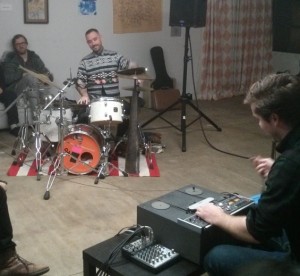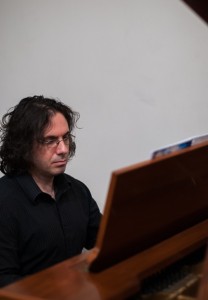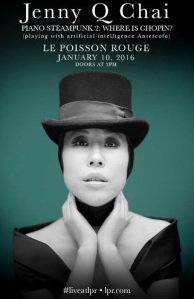 On Friday, January 22, 2016 the wulf in downtown Los Angeles presented a diverse concert of electronic music by four groups of artists. A standing-room only crowd turned out for an evening of intense sounds created by computer algorithm, spectral analysis and traditional percussion. The room was filled with all kinds of amplifiers, speakers, mixers, patch panels and miles of cable. The four sets made for a varied program that challenged both the mind and the ear.
On Friday, January 22, 2016 the wulf in downtown Los Angeles presented a diverse concert of electronic music by four groups of artists. A standing-room only crowd turned out for an evening of intense sounds created by computer algorithm, spectral analysis and traditional percussion. The room was filled with all kinds of amplifiers, speakers, mixers, patch panels and miles of cable. The four sets made for a varied program that challenged both the mind and the ear.
First up was PDRM, by John Krausbauer and David Kendall. According to the program notes this piece is “…constructed from a ‘just’ tuned, three-string electric guitar with real-time and algorithmic delay and spatialization processing.” Four large speakers were placed on the four corners of the completely darkened performance space that also included active strobe lights. PDRM began with a warm, droney sound from the bowed guitar, accompanied by a substantial bass line in the electronics, providing a solid foundation. The sound filled the room and the consistent texture immersed the audience in a congenial sonic wash. As the piece progressed the volume seemed to gradually increase and the tempo quickened slightly as well. PDRM is very powerful experience that takes control of the senses – there were occasional bass tones that were felt as well as heard. The complete darkness and compelling sounds command the listener’s attention; Krausbauer and Kendall might consider adding an aromatic component to their performances to further extend this sensual dimension. The steady drone and flickering of the strobes give PDRM a distinctly primordial feeling – as if the audience is gathered around some ancient communal bonfire, meditating together in a deep trance.
Next up was an improvisation by percussionist Ted Byrnes with William Hutson on accompanying electronics, and this marked their debut as a duo. Hutson operated an old school reel-to-reel tape machine fed with a ten foot loop of tape that stretched across the room and produced a steady stream of metallic clattering and crashes as well as what sounded like a barrel of broken glass shards being rolled across the floor. To this chaos Byrnes added his athletically active drumming with a variety of mallets and brushes on a standard drum kit along with a number of found objects. The rhythmic drumming formed a kind of counterpoint to the crashing tumult from the tape and this became an anchor for the ear. The piece took on an epic character as it progressed: the heroic drummer in combat with the forces of anarchy. This contrast was so effective that the listener often found himself rooting for the drumming to prevail. Byrnes was a constant blur of motion and activity, yet the continuous outpouring of the electronics added a helpful consistency to the texture, filling in for those times when Ted changed drum sticks or reached down to add a new object to his kit. There were quiet stretches, as when brushes were used on the drum heads, but overall the intensity and drama that emerged from this mix of electronics and drumming proved to be a winning combination. The addition of fierce electronics to the animated style of Ted Byrnes was inspired, achieving a new level of energy and excitement for this duo.
Cameron Shafii, the San Franciso-based composer was next, presenting a solo sound piece, part of a collaboration with Joe Gilmore that according to the program notes, “…transforms brass and string instruments by spectral analysis.” This began with a loud drum clap followed by exotic electronic tones that added a vaguely alien feel. The steady electronics were accompanied by a drumming rhythm, producing a sense of anxiety and mystery. The volume seemed to rise as the piece progressed and the drumming became more concentrated and powerful – at times the beats were felt as blows to the chest. The electronic sounds morphed into purer tones and a series of loud rumbles, like distant thunder could be heard. At one point the mood lightened and there were some lovely harmonies. The total darkness and the relentlessly increasing power soon restored the feeling of menace, however, and at times the sound overwhelmed the senses and verged on the painful. Cameron Shafii and Joe Gilmore have crafted a daunting listening experience that operates at the harrowing edges of human perception.
The last piece in the program was VRS, a project from Ellen Phan of Los Angeles who presented “…a new piece exploring modalities of experimental sound.” This piece deftly unpacked an eclectic variety of sounds – a loud buzzing, gongs, bells and the crash of smashing china. The pitches accelerated and became higher and more cutting even as the texture attained a sort of frenetic consistency. Voices were heard in an unintelligible scat singing and the electronic sounds assumed a bouncy, arcade-like feel. As the piece progressed a powerfully percussive hammering dominated, and this soon morphed into a nicely rhythmic groove. VRS is full of fast-changing textures that made for a refreshing wash of bright colors and energetic surfaces that agreeably filled the performance space and the listener’s ear.
Update on the wulf: The building has now been sold and the wulf is seeking new accommodations, although no schedule has been announced. Fund raising for the expected moving expenses has been successful and donations are still being accepted – see www.thewulf.org for details.


